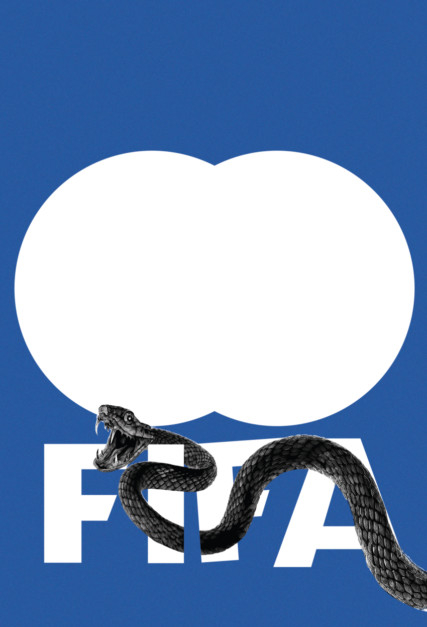
Football’s status as ‘The Beautiful Game’ has appeared risible in light of the game’s governing body Fifa being charged with a bevy of corruption charges on Wednesday.
Allegations of wrongdoing have continually dogged the much-maligned organisation, but last week’s unedifying events represent a nadir for embattled president Sepp Blatter and his cronies.
The fact that the charges hail from the US, a country for which ‘soccer’ remains a minority sport, exacerbates the crimes alleged against Blatter.
The US Department of Justice issued a 47-count indictment, charging 14 high-ranking officials with racketeering, wire fraud and money laundering conspiracies in a 24-year scheme. Outlining details of the US case, Attorney General Loretta Lynch said some Fifa executives — including vice-president Jeffrey Webb — had ‘used their positions to solicit bribes’. Richard Weber, the chief investigator of the IRS criminal investigations unit, said: “This is really the World Cup of fraud and today we are issuing Fifa a red card.”
The allegations largely began during the tenure of former Fifa president Joao Havelange, who enlisted the World Cup’s first corporate sponsors, expanded the number of teams and dramatically increased Fifa revenues from it.
In that time, Havelange took bribes from a company called International Sport and Leisure, in exchange for World Cup marketing and broadcast rights. Blatter allegedly knew about these bribes and attempted to cover them up upon taking office.
More recently, the decision to award the 2018 and 2022 World Cups to Russia and Qatar led to widespread accusations of vote buying. Two members of the executive committee were suspended before the vote due to the allegations, and afterward, the leader of England’s bid reported that he had been asked for millions of dollars and other bribes in exchange for votes.
Fifa launched its own investigation into the bidding process in 2012, but never published the full report. Michael Garcia, the former US attorney who led it, said the public summary — which largely exonerated Fifa — was inaccurate, and subsequently resigned.
Other scandals include match-fixing by World Cup officials, lamentable labour practices in Qatari stadia constructions and allegations that Blatter had bought votes to become Fifa president in 1998. Ever since, he has consolidated power as the most powerful figure in sport, allegedly using Fifa “development money” — paid to promote the sport in poor nations — as a tool to ensure support in re-elections, with money enriching football officials instead of building fields.
Many key figures in the football fraternity hailed Wednesday’s arrests, including Dubai sports ambassador Diego Maradona, who told the Argentinian radio station La Red: “They called me mad, but thankfully today the truth is out and I am enjoying it. They [at Fifa] hate soccer. They hate transparency. Enough shady dealings. Enough lying to the people.”
“This is the day that signifies the beginning of the end of the despicable, despotic reign of Fifa’s president, Sepp Blatter,” said the former editor of Britain’s Mirror newspaper, Piers Morgan, writing in the Daily Mail.
Yet, any cause for optimism about the potential demise of Blatter was quashed by the man himself on Thursday.
Blatter, who bid for a fifth term of re-election yesterday against Jordan’s Prince Ali Bin Al Hussain, and who told a hastily arranged Fifa congress meeting on Thursday: “We cannot allow the reputation of football and Fifa to be dragged through the mud and it has to stop here and now. Many people hold me ultimately responsible for the global football community. I cannot monitor everyone all of the time. If people want to do wrong they will also try to hide it.”
But he added: “It must fall to me to bear the responsibility for the reputation and well-being of our organisation and to find a way forward to fix things.”
Blatter admitted the “next few months will not be easy — I am sure bad news will follow”, but that with yesterday’s vote, “we have the opportunity to begin on what will be a long and difficult road to rebuilding trust”.
Forever intransigent, Blatter has faced a growing clamour to resign, including Uefa president Michel Platini telling him the same with “tears in my ears” on Thursday.
Yet, Fifa’s ‘Mr Teflon’, 79, has perennially resisted overwhelming pressure to remain public enemy number one.
His summary removal would do much to repair football’s sullied image, but it seems like it will be a long time before ‘The Beautiful Game’ will return to its lustre of old.










